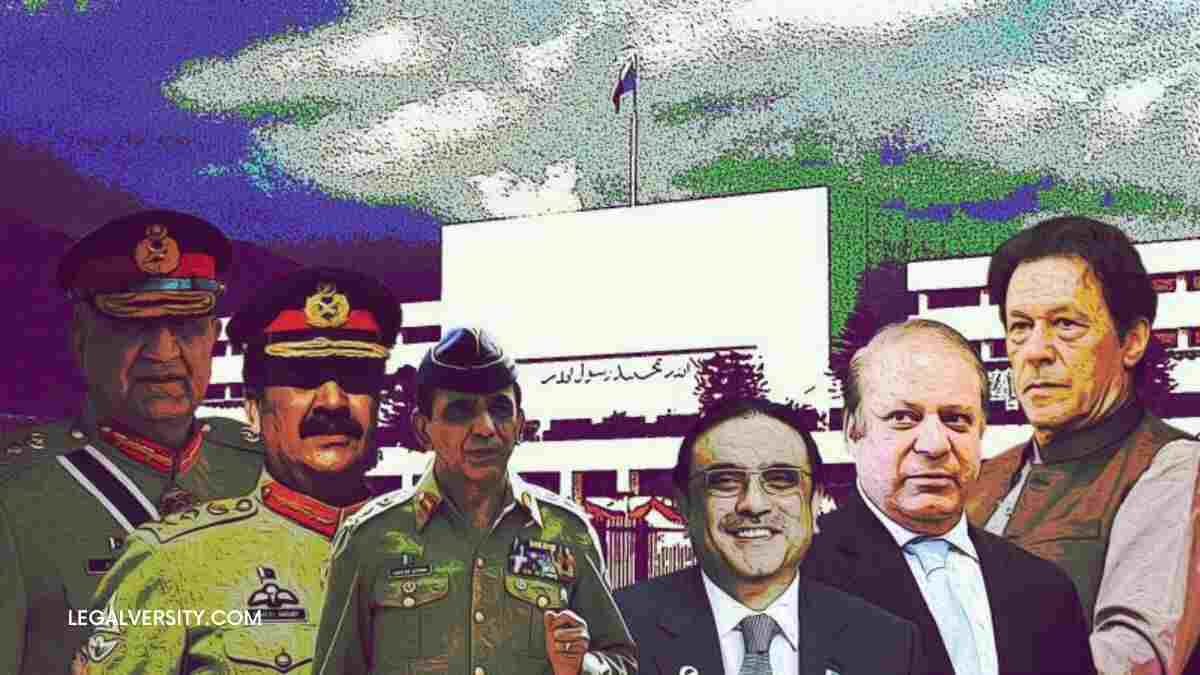Establishment in Pakistan, when used in reference to the Pakistan Army, implies a wider power structure that shapes the critical political, economic, and security decisions in the country. This power structure is understood to be chief among the Pakistan Army, the military, the intelligence agencies, key bureaucratic elements, and occasionally influential business figures.
In this article, I am going to share with you the reasons why the Pakistan Army is often referred to as the “Establishment”.
Political Influence
History shows that the Pakistan Army has been deeply engaged in the politics of the country. It has initiated numerous military coups and exercises direct military rule. Over the decades, the army has helped to create Pakistan’s governance and policies, permitting it to exert considerable authority even in simple civilian governments. Over time, either from its ranks or as a support, the army led the major political transformation in the country. This hold on politics allows the army to emerge as a central locus of national power.
Historical context: Pakistan has witnessed three major military coups (1958, 1977, 1999), and under each of them, Army governed the country.
Role today: The army still has considerable powers, even under civilian rule, in crucial matters such as national security and foreign relations.
Security and Foreign Policy
Undoubtedly, the military has greatly influenced national security and foreign policy concerning relations with India, Afghanistan, and the US in Pakistan. The military has become a major player in the governance of the country due to its involvement in these critical sectors.
The army is itself responsible for the security of the nation, which grants him a special position within Pakistan’s body politic. Intervention in issues like defense, counterterrorism, and internal security allows the military to have the decisive say on matters regarding these fronts.
Role of the ISI (Inter-Services Intelligence)
The Inter-Services Intelligence is the intelligence agency of Pakistan and has always had close ties with the military. All the security-related activities, both from within the country and abroad, strengthen the authority, control, and functioning of the army.
The ISI plays a significant role in determining policies concerning national security and internal stability. This further increases the army’s influence on the country in general.
Economic Power
The Pakistan military controls and has a stake in a multitude of industries, including but not limited to, real estate, construction, and energy. This economic power makes that army more influential over not just defense matters but also the economy of Pakistan.
Military-Run Businesses
Business like the Frontier Works Organization (FWO) and the National Logistics Cell (NLC) are run by the military and deal with construction and logistics.
Impact on the Economy
While these sectors operate under the army’s control, it, thus, becomes a base for economic development in Pakistan beyond defense.
Guardianship of the State
In Pakistan, there seems to be a belief in the army as a stabilizing force that protects the integrity and sovereignty of the state. This belief has bestowed upon the army the concept of a “guardian” of the state, which might have given it an edge in being termed as “Establishment.”
With the government with Imran Khan and later taken over by the Pakistan Democratic Movement, people have lately lost their original belief in the military as the sole defender of Pakistan. Events after Khan’s ouster have brought a change in perception among people.
Many of the citizens, especially those in favor of Khan, came forward publicly and assailed the role played by the military in political governance. Protests and criticism emanating from political circles and civil society have shed light on public grievances regarding the military’s role in politics and its ideational image as a neutral stabilizing force has suffered a blow.
This shift of circumstances tentatively puts before the eyes an otherwise unthinkable scenario: the long established role of the army as unconditional protector of the state is under question. This follows the very real growing political fissures and public acknowledgment of the increasing reach of the military in the arrangement and transition of governments. Its status as the “Establishment” may remain constant against the rising tide. For many, perception of the army as a protector of Pakistan is not what it once was.
Conclusion
The term “Establishment” therefore refers to a combination of military, intelligence, bureaucratic, and elite influences wherein the army plays a dominant role in the ability to shape power dynamics in Pakistan.
Thus, the term “Establishment” is used to describe the Pakistan Army because of its interests that are significant and institutionalized deep-rooted in politics, security, intelligence, and the economy. The Army is above a strictly military institution since it acts as an advisor on most matters of importance to Pakistan. It is, therefore, the “Establishment” that has such significant and influential power over the future of this country.
It is not limited to one sphere and manages to penetrate into the political and economic grounds as well as public opinions, thus turning it into one of the most powerful institutions in Pakistan.
Also read:
- CSS Exam 2025: Complete Guide for Beginners for CSS 2025
- CSS Notes and Study Material
- US Interests in the Middle East (A Study)

